山东省章丘市曹范中学九年级英语 Unit 1 How do you study for a test?学案
九年级英语-Unit1_How_do_you_study_for_a_testAlHHHn
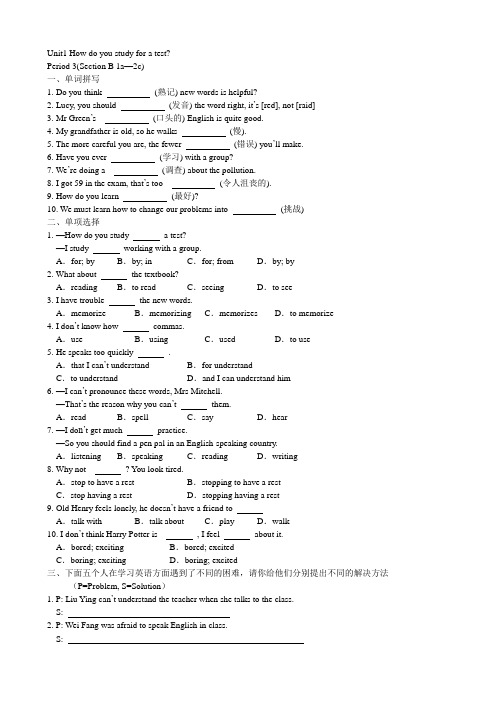
Unit1 How do you study for a test?Period 3(Section B 1a—2c)一、单词拼写1. Do you think (熟记) new words is helpful?2. Lucy, you should (发音) the word right, it’s [red], not [raid]3. Mr Green’s (口头的) English is quite good.4. My grandfather is old, so he walks (慢).5. The more careful you are, the fewer (错误) you’ll make.6. Have you ever (学习) with a group?7. We’re doing a (调查) about the pollution.8. I got 59 in the exam, that’s too (令人沮丧的).9. How do you learn (最好)?10. We must learn how to change our problems into (挑战)二、单项选择1. —How do you study a test?—I study working with a group.A.for; by B.by; in C.for; from D.by; by2. What about the textbook?A.reading B.to read C.seeing D.to see3. I have trouble the new words.A.memorize B.memorizing C.memorizes D.to memorize4. I don’t know how commas.A.use B.using C.used D.to use5. He speaks too quickly .A.that I can’t understand B.for understandC.to understand D.and I can understand him6. —I can’t pronounce these words, Mrs Mitchell.—That’s the reason why you can’t them.A.read B.spell C.say D.hear7. —I do n’t get much practice.—So you should find a pen pal in an English-speaking country.A.listening B.speaking C.reading D.writing8. Why not ? You look tired.A.stop to have a rest B.stopping to have a restC.stop having a rest D.stopping having a rest9. Old Henry feels lonely, he doesn’t have a friend toA.talk with B.talk about C.play D.walk10. I don’t think Harry Potter is , I feel about it.A.bored; exciting B.bored; excitedC.boring; exciting D.boring; excited三、下面五个人在学习英语方面遇到了不同的困难,请你给他们分别提出不同的解决方法(P=Problem, S=Solution)1. P: Liu Ying can’t understand the teacher when she talks to the class.S:2. P: Wei Fang was afraid to speak English in class.S:3. P: Li Lei doesn’t have a partner to practice English with. S:4. P: Wu Dong doesn’t get much writing practice.S:5. P: My brother can’t remember a lot of new words.S:。
九年级英语全册 Unit 1《How do you study for a test
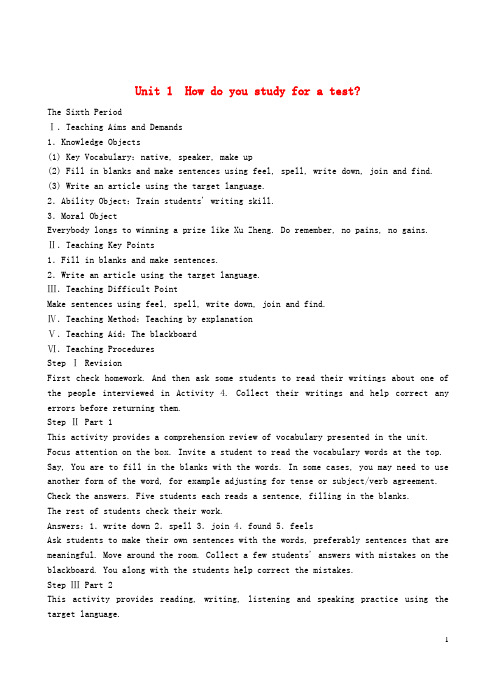
Unit 1 How do you study for a test?The Sixth PeriodⅠ.Teaching Aims and Demands1.Knowledge Objects(1) Key Vocabulary:native, speaker, make up(2) Fill in blanks and make sentences using feel, spell, write down, join and find.(3) Write an article using the target language.2.Ability Object:Train students' writing skill.3.Moral ObjectEverybody longs to winning a prize like Xu Zheng. Do remember, no pains, no gains. Ⅱ.Teaching Key Points1.Fill in blanks and make sentences.2.Write an article using the target language.Ⅲ.Teaching Difficult PointMake sentences using feel, spell, write down, join and find.Ⅳ.Teaching Method:Teaching by explanationⅤ.Teaching Aid:The blackboardⅥ.Teaching ProceduresStep Ⅰ RevisionFirst check homework. And then ask some students to read their writings about one of the people interviewed in Activity 4. Collect their writings and help correct any errors before returning them.Step Ⅱ Part 1This activity provides a comprehension review of vocabulary presented in the unit. Focus attention on the box. Invite a student to read the vocabulary words at the top. Say, You are to fill in the blanks with the words. In some cases, you may need to use another form of the word, for example adjusting for tense or subject/verb agreement. Check the answers. Five students each reads a sentence, filling in the blanks.The rest of students check their work.Answers:1.write down 2.spell 3.join 4.found 5.feelsAsk students to make their own sentences with the words, preferably sentences that are meaningful. Move around the room. Collect a few students' answers with mistakes on the blackboard. You along with the students help correct the mistakes.Step Ⅲ Part 2This activity provides reading, writing, listening and speaking practice using the target language.Read the instructions to the class. Ask students to look at the Notes on Xu Zheng and Notes on Xu Zheng's essay. Elicit how to convert the notes into sentences in an article. Instruct students to say, Xu Zheng likes writing notes , watching movies and listening to pop songs. He thinks most people speak English as a second language.Ask students to complete the work individually. Say, the order of information will vary but should contain all the points in the notes.As students are doing this, move around the room checking progress and offering help when necessary. If some students have difficulty in writing an article, encourage him/her to write two or three sentences.Step Ⅳ Just for Fun!This activity provides reading and speaking practice with the target language.Ask all the students to read the conversation. Ask, What is funny about this cartoon story? Help students to answer, The alien thinks he can learn English by eating an English hook. Invite pairs of students to present this conversation to the rest of the class.Step Ⅴ SummarySay, In this class, we've reviewed some vocabulary words presented in the unit. And we've also made up sentences using some words.Step Ⅵ Homework(1) Review all the language points presented in this unit.(2) Finish off the exercises on pages 3~4 of the workbook.Step Ⅶ Blackboard DesignUnit 1 How do you study for a test?Self checkThe Sixth PeriodSample answers to Activity 1:1.Please write down the words on the blackboard.2.I can't spell some English words.3.Why don't you join an English club?4.I have found my keys.5.Cotton feels soft.。
九年级英语Unit_1_How_do_you_study_for_a_test知识要点总结
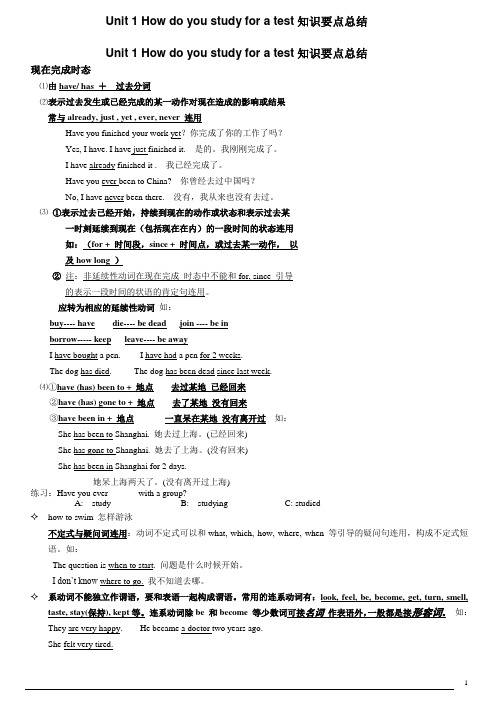
Unit 1 How do you study for a test知识要点总结现在完成时态⑴由have/ has +过去分词⑵表示过去发生或已经完成的某一动作对现在造成的影响或结果常与already, just , yet , ever, never 连用Have you finished your work yet?你完成了你的工作了吗?Yes, I have. I have just finished it.是的。
我刚刚完成了。
I have already finished it .我已经完成了。
Have you ever been to China?你曾经去过中国吗?No, I have never been there.没有,我从来也没有去过。
⑶①表示过去已经开始,持续到现在的动作或状态和表示过去某一时刻延续到现在(包括现在在内)的一段时间的状态连用如:(for + 时间段,since + 时间点,或过去某一动作,以及how long )②注:非延续性动词在现在完成时态中不能和for, since 引导的表示一段时间的状语的肯定句连用。
应转为相应的延续性动词如:buy---- have die---- be dead join ---- be inborrow----- keep leave---- be awayI have bought a pen.------ I have had a pen for 2 weeks.The dog has died.------- The dog has been dead since last week.⑷①have (has) been to + 地点去过某地已经回来②have (has) gone to + 地点去了某地没有回来③have been in + 地点一直呆在某地没有离开过如:She has been to Shanghai. 她去过上海。
九年级英语全册Unit1HowdoyoustudyforatestSelfcheckandReadi
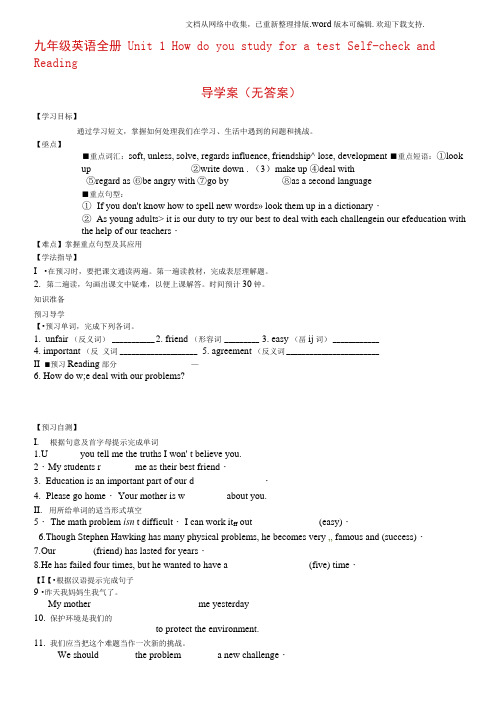
九年级英语全册Unit 1 How do you study for a test Self-check and Reading导学案(无答案)【学习目标】通过学习短文,掌握如何处理我们在学习、生活中遇到的问题和挑战。
【亟点】■重点词汇:soft, unless, solve, regards influence, friendship^ lose, development ■重点短语:①lookup ②write down . (3)make up ④deal with⑤regard as ⑥be angry with ⑦go by ⑧as a second language■重点句型:①If you don't know how to spell new words» look them up in a dictionary・②As young adults> it is our duty to try our best to deal with each challengein our efeducation withthe help of our teachers・【难点】掌握重点句型及其应用【学法指导】I•在预习时,要把课文通读两遍。
第一遍读教材,完成表层理解题。
2.第二遍读,勾画出课文中疑难,以便上课解答。
时间预计30钟。
知识准备预习导学【•预习单词,完成下列各词。
1.unfair (反义词)___________2. friend (形容词_________3. easy (畐ij词)____________4. important (反义词____________________5. agreement (反义词________________________II■预习Reading部分—6. How do w;e deal with our problems?【预习自测】I.根据句意及首字母提示完成单词1.U ______ you tell me the truths I won' t believe you.2・My students r _______ m e as their best friend・cation is an important part of our d _____________ ・4.Please go home・ Your mother is w ________ about you.II.用所给单词的适当形式填空5・ The math problem isn t difficult・ I can work it ff out ____________ (easy)・6.Though Stephen Hawking has many physical problems, he becomes very … famous and (success)・7.Our ______ (friend) has lasted for years・8.He has failed four times, but he wanted to have a _______________ (five) time・【I【•根据汉语提示完成句子9 •昨天我妈妈生我气了。
九年级英语Unit 1 How do you study for a test知识精讲
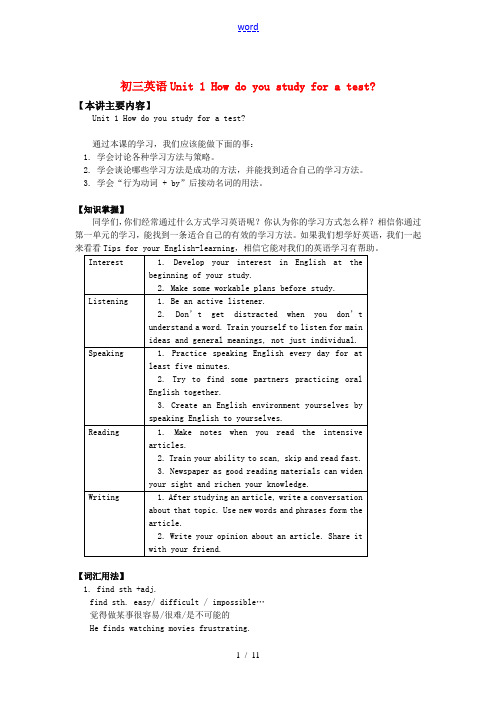
初三英语Unit 1 How do you study for a test?【本讲主要内容】Unit 1 How do you study for a test?通过本课的学习,我们应该能做下面的事:1. 学会讨论各种学习方法与策略。
2. 学会谈论哪些学习方法是成功的方法,并能找到适合自己的学习方法。
3. 学会“行为动词 + by”后接动名词的用法。
【知识掌握】同学们,你们经常通过什么方式学习英语呢?你认为你的学习方式怎么样?相信你通过第一单元的学习,能找到一条适合自己的有效的学习方法。
如果我们想学好英语,我们一起【词汇用法】1. find sth +adj.find sth. easy/ difficult / impossible…觉得做某事很容易/很难/是不可能的He finds watching movies frustrating.他认为看电影是令人不愉快的。
He said that, after Russian, I should find German easy.在学过俄语之后,我应该觉得德语容易学。
find it +adj. to do sth.He found it almost impossible to express what he wanted to say.他觉得要表达他想说的话几乎是不可能的。
think it + adj + to do sthWe thought it unnecessary to argue with him about it.2. end up +doing sth. 结果为……;以……结束(尤其指意料之外的事情)We were going to go out, but ended up watching videos.我们原计划外出,但结果却是在家看录像。
3. It is +adj. +for sb. to do 对于某人来说,做某事是……的It is impossible for us to finish the work without your help.对于我们来说,没有你的帮助来完成工作是不可能的。
九年级英语全册Unit1HowdoyoustudyforatestHowtolearnEnglish
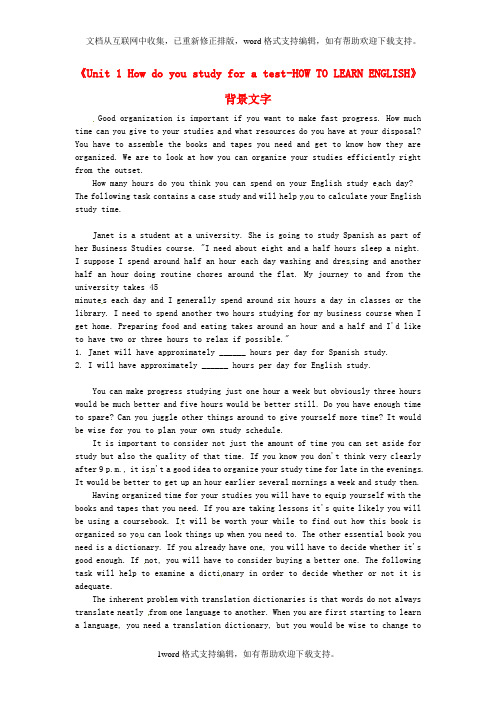
《Unit 1 How do you study for a test-HOW TO LEARN ENGLISH》背景文字Good organization is important if you want to make fast progress. How much time can you give to your studies a nd what resources do you have at your disposal? You have to assemble the books and tapes you need and get to know how they are organized. We are to look at how you can organize your studies efficiently right from the outset.How many hours do you think you can spend on your English study e ach day? The following task contains a case study and will help y ou to calculate your English study time.Janet is a student at a university. She is going to study Spanish as part of her Business Studies course. "I need about eight and a half hours sleep a night.I suppose I spend around half an hour each day washing and dres sing and another half an hour doing routine chores around the flat. My journey to and from the university takes 45minute s each day and I generally spend around six hours a day in classes or the library. I need to spend another two hours studying for my business course when I get home. Preparing food and eating takes around an hour and a half and I'd like to have two or three hours to relax if possible."1. Janet will have approximately ______ hours per day for Spanish study.2. I will have approximately ______ hours per day for English study.You can make progress studying just one hour a week but obviously three hours would be much better and five hours would be better still. Do you have enough time to spare? Can you juggle other things around to give yourself more time? It would be wise for you to plan your own study schedule.It is important to consider not just the amount of time you can set aside for study but also the quality of that time. If you know you don't think very clearly after 9 p.m., it is n't a good idea to organize your study time for late in the evenings. It would be better to get up an hour earlier several mornings a week and study then. Having organized time for your studies you will have to equip yourself with the books and tapes that you need. If you are taking lessons it's quite likely you will be using a coursebook. I t will be worth your while to find out how this book is organized so yo u can look things up when you need to. The other essential book you need is a dictionary. If you already have one, you will have to decide whether it's good enough. If not, you will have to consider buying a better one. The following task will help to examine a dicti onary in order to decide whether or not it is adequate.The inherent problem with translation dictionaries is that words do not always translate neatly from one language to another. When you are first starting to learn a language, you need a translation dictionary, but you would be wise to change toan explanation type as soon as possible.如何学英语如果你想取得很快的进步,良好的学习安排很重要。
九年级英语全册 Unit 1 How do you study for a test Section
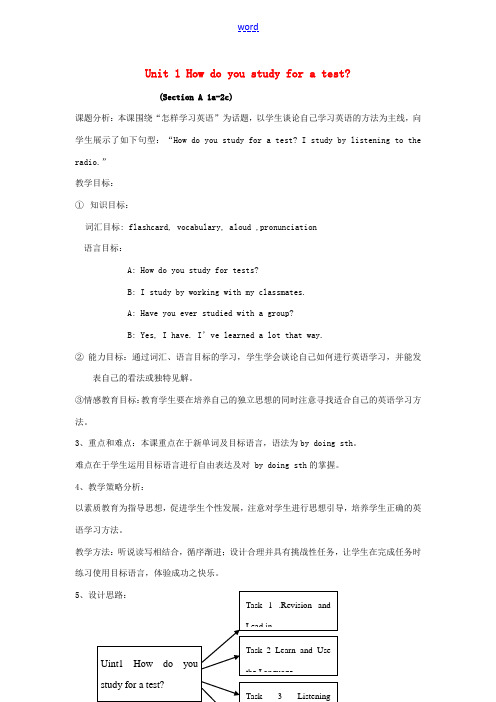
Unit 1 How do you study for a test?(Section A 1a-2c)课题分析:本课围绕“怎样学习英语”为话题,以学生谈论自己学习英语的方法为主线,向学生展示了如下句型:“How do you study for a test? I study by listening to the radio.”教学目标:①知识目标:词汇目标: flashcard, vocabulary, aloud ,pronunciation语言目标:A: How do you study for tests?B: I study by working with my classmates.A: Have you ever studied with a group?B: Yes, I have. I’ve learned a lot that way.② 能力目标:通过词汇、语言目标的学习,学生学会谈论自己如何进行英语学习,并能发表自己的看法或独特见解。
③情感教育目标:教育学生要在培养自己的独立思想的同时注意寻找适合自己的英语学习方法。
3、重点和难点:本课重点在于新单词及目标语言,语法为by doing sth。
难点在于学生运用目标语言进行自由表达及对 by doing sth的掌握。
4、教学策略分析:以素质教育为指导思想,促进学生个性发展,注意对学生进行思想引导,培养学生正确的英语学习方法。
教学方法:听说读写相结合,循序渐进;设计合理并具有挑战性任务,让学生在完成任务时练习使用目标语言,体验成功之快乐。
5教学准备:课件、录音机教学过程:附练习题:1. I study English by _______ _______(制作抽认卡)2. In class you must read English ______(大声地) to practice ____ (发音).3. Reading can improve my _______(speak)skills.4. You can also make ________(词汇)lists.5. ____you_____ ever (study) with a group?二.Chose the right answers.()1.-How do you study for a test? -I study ______A. for practicing conversationsB. to practice conversationsC. by practice conversationsD. by practicing conversations ()2. Can you think of another way ___the problem?A. of working outB. to working outC. by working outD. work out ()3. She said that the best way __new words was ___English magazines.A. to learn, to readingB. to learn, by readingC. of learning, readD. of learning, read()4. How do you study ____ a test?A to B. for C of D in()5.Mary studies English _______ reading the books.A toB byC withD in()6.Tom studies English by _______ vocabulary list.A makingB makeC madeD to make。
九年级英语Unit 1 How do you study for a test--The secon
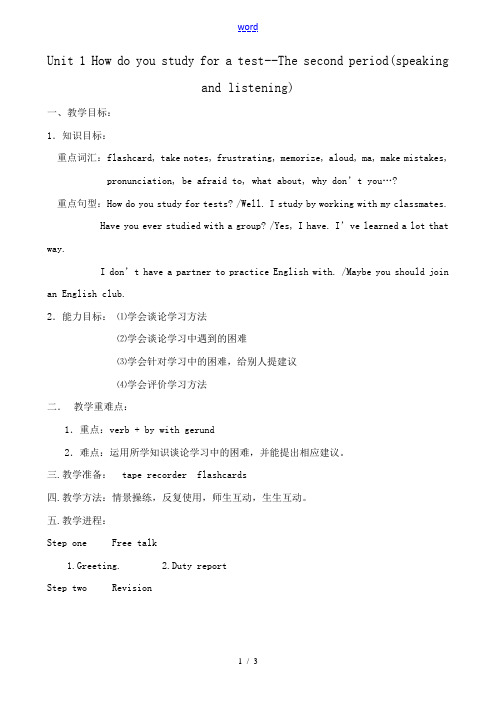
Unit 1 How do you study for a test--The second period(speakingand listening)一、教学目标:1.知识目标:重点词汇:flashcard, take notes, frustrating, memorize, aloud, ma, make mistakes, pronunciation, be afraid to, what about, why don’t you…?重点句型:How do you study for tests? /Well. I study by working with my classmates.Have you ever studied with a group? /Yes, I have. I’ve learned a lot that way.I don’t have a partner to practice English with. /Maybe you should join an English club.2.能力目标:⑴学会谈论学习方法⑵学会谈论学习中遇到的困难⑶学会针对学习中的困难,给别人提建议⑷学会评价学习方法二.教学重难点:1.重点:verb + by with gerund2.难点:运用所学知识谈论学习中的困难,并能提出相应建议。
三.教学准备: tape recorder flashcards四.教学方法:情景操练,反复使用,师生互动,生生互动。
五.教学进程:Step one Free talk1.Greeting.2.Duty reportStep two RevisionAsk some Ss to give the class his/her learning-method reports. Then ask and answer some questions.Step three Listening and practice1.Some Ss are talking about how they study for a test.. Let’s listen to the tapeand find the methods they study for a test. Students practice this conversation in pairs.2.We’ll listen another conversation .The Ss are talking about English. A girlis asking members of the English club some questions. Listen and check the question you hear. Ss listen and check the answers. Listen it again, this time let’s find the answers to each question. Ss listen and check the answers. Step four Task`T: I think each of you have many ways of learning English. Please tell your partners.Group work. Ss work in groups. Talk about their ways. Take notes and pare them.A: How do you study English?B:I study English by listening to tapes. /He /She studies English by working with a group. /We study English by singing English songs.step five Listening and practice1.T: Learning English can be difficult. What things are difficult for you? Pleasecheck the things which you find difficult.2.Paul also finds sth difficult. Listen to the conversation between Paul and histeacher. Check the things are not easy for Paul. Ss listen and check.3.T: What’s the teacher’s advice? Listen again and write the letter of eachproblems in 2a in front of the correct solution in activity 2b. Ss listen and check.Step six taskEach pair can make a conversation by using information from 2a and 2b.六. 作业设计: Ask Ss to make a survey. Do you think what is the best way to learn English ?七. 板书设计:。
九年级英语全册Unit1Howdoyoustudyforatest教案1人教新目标版

《Unit 1 How do you study for a test》教案(1)Teaching goals:语言知识目标:1.学会用by短语表达学习方法。
2・ Vocabularyflashcard , take notes , frustrating , memorize , aloud , comma , make mistakes ,pronunciation ,be afraid of , Why don' t you … ?3・ Pattern: How do you study for a test ?Well ・I study by working with my classmates ・Have you e r ver studied with a group ?Yes , I have ・I* ve learned a lot that way ・语言技能:学生能与同学们交流和讨论学习方法。
学习策略:使学生能根据自己的实际采用适当的学习方法,并形成个性化的学习。
文化意识:了解英美国家学生学习的主要方法。
情感态度:形成相互交流相互促进的学习氛用。
Important and difficult points :1.Functions: Talk about how to study ・2・ Structures: Verb + by with gerund ・Teaching aids: tape and tape recorder, some flashcards・Period 1Teaching contents :Section A la, lb, lc, 2a, 2b, 2c・Teaching procedures:Step 1 Leading in1.Greetings ・2.Ask some students about their summer holidayStep 2 Pre-taskSB Page 2, la ・1.Ask several .students to tell you how they study for a test ・ Write their answers on theblackboard ・2.Call some volunteers to read the phrases on Page 2 ・ Explain something about thestructures “verb + by with gerund "・3.Read the phrases ,students repeat ・Step 3 While-taskSB Page 2, lb ・Read the instructions to the students and make sure students know what to do ・ Then play recording and check the answers ・SB Page 2 , lc ・1.First students work in pairs to talk about the picture ・2.Then ask several pairs to present their dialogues ・SB Page 3 , 2a & 2b ・1・ Read the instructions to students and ask some volunteers to read after you if necessary ・2.Play the recording ,students finish the work ・Check the answers ・3.Ask some students to read the questions and answers in pairs ・Step 4 Post-task1・ In pairs ,students talk about how to study for several minutes ・2.Ask some students how they study individually ・3.SB Page 3 , 2c ・Get students work in pairs ・Ask a few pairs to present theirconversations ・Step 5 Grammar FocusRead the questions and answers in the grammar box ・ Students repeat ・ Explain something about them if it is necessary ・Step 6 Homework1・I study English ____________________ (看英语杂志)・2.I study English ____________________ (记流行歌曲歌词).3.I study English ____________________ (加入英语俱乐部).4.you , learn , by , do , English t aloud , reading5.can* t , new , words , lots of t I , memorize ・教学后记:Period 2Teaching contents: Section A 3a , 3b , 4 , Section B la , lb , lc , 2a , 2b , 2c ・Teaching procedures :Step 1 RevisionAsk some students how they study English , get them to answer individually ・Step 2 ReadingSB Page 4 , 3a ・1・ First ,ask one volunteer to read the article aloud to the class ・2.Have Srtudents read through the passage one or two times and complete the chart ontheir own ・3.Correct the answers ・Step 3 PairworkSB Page 4,3b ・1.Read the instructions to the class and ask a pair of students to practice the sampleconversation ・2.Then in pairs , have students make their own conversation according to activity 3a・3.Ask some pairs to present their conversations ・SB Page 4 , Part 4 ・1.Ask students to check what they do to learn English in the chart ・ Then get themto work in pairs to interview their partner ・2.Call some pairs to act out their dialogues in front of the class ・Step 4 PracticeSB Page 5 , la & lb ・1.Ask one student to read the sentences to the class ・2.Then have students check the r statements which are true for them and ask them to addsome other different things ・3.Ask several students to 「write their lists on the blackboard and discuss them with thewhole class ・Step 5 ListeningSB Page 5 , 2a & 2b ・1・ Ask two students to read the challenges and solutions ・P If necessary , have students repeat after you ・2.Play the recording two or three times , let students listen and finish the work ・3.Ask one student to have his/her answers with the class ・4.Correct the answers ・Step 6 PairworkSB Page 5 , 2c ・In pairs , students role play conversations using the information from activity 2a and 2b ・Then ask some pairs to present their dialogue to the class ・Step 7 HomeworkWrite an article to introduce how you study English ・教学后记:门Period 3Teaching contents:Section B 3a, 3b , 3c , 4 , selfcheck ・Teaching procedures :Step 1 Revision1.Greetings ・2.Check the homework ・Step 2 ReadingSB Page 6 , 3a ・1.Read the instructions and make sure students know what to do ・2.Give students several minutes to read the article and finish the task ・3.After students finished , ask one student to write his/her answers on the blackboard・4.Correct the answers ・5.Ask one volunteer to read the article aloud to the class , offer assistance if necessary ・Step 3 WritingSB Parge 6 , 3b ・First , have students finish the letter on their own , while they are working , walk around and give them some help ・ Then ask two students to read their letter aloud to the class ・Finally answer some questions the students may have ・Step 4 InterviewSB Page 6 , Part 4 ・1.Read the instructions and explain how to finish this task ・2.Divide the class into groups of four ・In each group , each student takes turninterviewing the other students and take notes ・3.Ask some groups to tell the class about their answers ・Step 5 SelfcheckSB Page 7 , Part 1 ・1・ Students finish it on their own first , then check the answers with the whole class ・2.Ask some studentSr to make their own sentences with these words orally ・SB Page r7 , Part 2 ・1.First , read the instructions and explain something in the notes ・2・ Ask students to write an article ・3.Ask someone to read his article to the class ・Step 6 HomeworkSB Page 6 t 3c ・Have students finish the article as their homework ・教学后记;Period 4Teaching contents : Reading: How do you deal with our problems ?Teaching procedures :Step 1 Leading inAsk students to thing of some reading strategies they have learned before , and write down them on the blackboar n d ・Step 2 Pre-taskSB Page 8 t Section 1 ・1.Let students think of some problems they have had recently ・ Then in pairs , tell theirpartner how they dealt with them ・2.In pairs , get students to look up the words in activity lb ・Step 3 While-taskSB Page 8 , Section 2 ・Explain something about the learning strategy ・2.Let the students scan the passage for main idea ・3.Explain some phrases:deal with try one* s best to do sthIt' s our duty to do sth compare …to …Let1 s not worry about our problems t let * s face the challenges instead ・4.Let students read the passage again ,this time read carefully ・5.Ask some comprehension questions about the passage ・Step 4 Post-taskSB Page 9, Section 3 ・1・ 3& ・Students finish it first , then check the answers with the whole class ・2.3b・Help students to finish the work ・3.3c・First let students do it on their own ,then check the answers ・Step 5 HomeworkSB Page 9 ,Section 4 ・1・ First discuss it with the whole class , then get the students to write a short passage about the ways of dealing with problems ・2. Have them write it on their exercise books ・教学后记,Additional : some usefulmake mistakes laugh at dealwith not at all be afraid of beafraid to take notes rbe angrywith try one' s best to do sthWhy don' t …? worry aboutcomplain about change intocompare …to/with …some useful expressions in this unit犯错,出错嘲笑,取笑处理,应付害怕害怕,不敢做笔记,做记录对…感到生气为什么不…抱怨,投诉把…变成把…与…相比be angry withcomplain aboutchange …into …think about。
山东省章丘市曹范中学九年级英语 Unit 1 How do you study for a test?学案(无答案) 人教新目标版
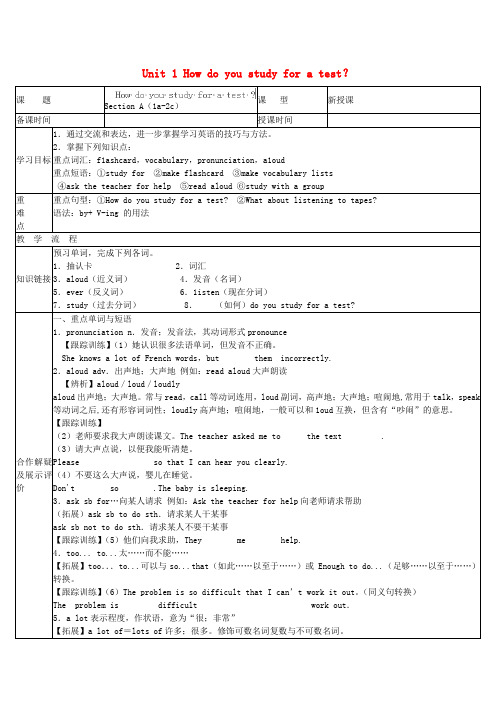
Unit 1 How do you study for a test?课题Section A(1a-2c)课型新授课备课时间授课时间学习目标1.通过交流和表达,进一步掌握学习英语的技巧与方法。
2.掌握下列知识点:重点词汇:f1ashcard,vocabulary,pronunciation,a1oud重点短语:①study for ②make flashcard ③make vocabulary lists ④ask the teacher for help ⑤read aloud ⑥study with a group重难点重点句型:①How do you study for a test? ②What about listening to tapes? 语法:by+ V-ing 的用法教学流程知识链接预习单词,完成下列各词。
1.抽认卡 2.词汇3.aloud(近义词) 4.发音(名词)5.ever(反义词)6.1isten(现在分词)7.study(过去分词) 8.(如何)do you study for a test?合作解疑及展示评价一、重点单词与短语1.pronunciation n.发音;发音法,其动词形式pronounce【跟踪训练】(1)她认识很多法语单词,但发音不正确。
She knows a lot of French words,but them incorrectly.2.aloud adv.出声地;大声地例如:read aloud大声朗读【辨析】aloud/loud/loudlyaloud出声地;大声地。
常与read,call等动词连用,loud副词,高声地;大声地;喧闹地,常用于talk,speak 等动词之后,还有形容词词性;loudly高声地;喧闹地,一般可以和1oud互换,但含有“吵闹”的意思。
【跟踪训练】(2)老师要求我大声朗读课文。
The teacher asked me to the text .(3)请大声点说,以便我能听清楚。
山东省章丘市曹范中学九年级英语 Unit 1 How do you s
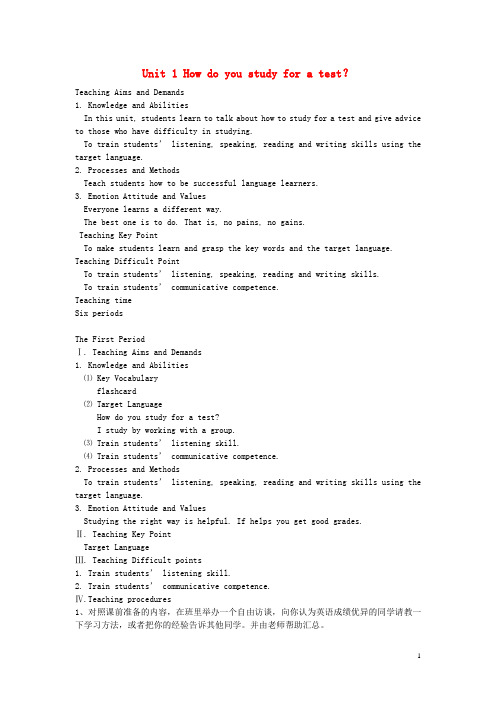
Unit 1 How do you study for a test?Teaching Aims and Demands1. Knowledge and AbilitiesIn this unit, students learn to talk about how to study for a test and give advice to those who have difficulty in studying.To train students’ listening, speaking, reading and writing skills using the target language.2. Processes and MethodsTeach students how to be successful language learners.3. Emotion Attitude and ValuesEveryone learns a different way.The best one is to do. That is, no pains, no gains.Teaching Key PointTo make students learn and grasp the key words and the target language. Teaching Difficult PointTo train students’ listening, speaking, reading and writing skills.To train students’ communicative competence.Teaching timeSix periodsThe First PeriodⅠ. Teaching Aims and Demands1. Knowledge and Abilities⑴ Key Vocabularyflashcard⑵ Target LanguageHow do you study for a test?I study by working with a group.⑶Train students’ listening skill.⑷ Train s tudents’ communicative competence.2. Processes and MethodsTo train students’ listening, speaking, reading and writing skills using the target language.3. Emotion Attitude and ValuesStudying the right way is helpful. If helps you get good grades.Ⅱ. Teaching Key PointTarget LanguageⅢ. Teaching Difficult points1. Train students’ listening skill.2. Train students’ communicative competence.Ⅳ.Teaching procedures1、对照课前准备的内容,在班里举办一个自由访谈,向你认为英语成绩优异的同学请教一下学习方法,或者把你的经验告诉其他同学。
山东地区 人教版九年级英语Unit1《How do you study f
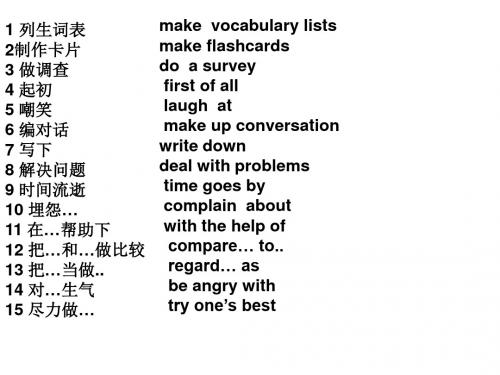
make vocabulary lists
2制作卡片
make flashcards
3 做调查
do a survey
4 起初
Байду номын сангаасfirst of all
5 嘲笑
laugh at
6 编对话
make up conversation
7 写下
write down
8 解决问题
deal with problems
9 I don’t know how _______(use) commas. 10 I can’t understand ______(speak) English. 11I decided to ___lots of grammar ___in every class.(做笔记) 12 I am also afraid ___ (speak) in class. 13 She had trouble____(make) complete sentences. 14 He _____the little cat ____a good friend.(把 当做 ) 15 It is our duty ____(try) our best ___(deal) with each challenge___ ___ ____ ___ our teachers. 16 Let’s not ___ ____(担心)our problems, Let’s face the challenges _____(代替) 17 Why don’t you join the club and practice____ (speak) English? 18 If you don’t work hard, you will fall behind.(同义) 19 I can’t understand him, Lily can’t understand,__.
- 1、下载文档前请自行甄别文档内容的完整性,平台不提供额外的编辑、内容补充、找答案等附加服务。
- 2、"仅部分预览"的文档,不可在线预览部分如存在完整性等问题,可反馈申请退款(可完整预览的文档不适用该条件!)。
- 3、如文档侵犯您的权益,请联系客服反馈,我们会尽快为您处理(人工客服工作时间:9:00-18:30)。
5.I study English(通过制作)f1ashcards.
6.(怎么样)1istening to tapes?
7.这个问题太难了,我理解不了。
It'shardmethis question.
8.朗读能提高你的口语。
canyour spoken English.
课后练习
1.根据句意及首字母提示完成单词
1.I can’t get the pof the word right.
2.Reading ain the morning is a good way to 1earn English well.
3.He 1earns English by making v1ists。
【拓展】提建议的其他表达方式有:
(1)Let’s do...(2)Shall we do...?(3)Why don't you.../Why not do...?
(4)Would you mind doing...?(5)You should..(6)You’d better(not)do...·
1.pronunciation n.发音;发音法,其动词形式pronounce
【跟踪训练】(1)她认识很多法语单词,但发音不正确。
She knows a lot of French words,but them incorrectly.
2.aloud adv.出声地;大声地例如:read aloud大声朗读
例如:The old woman makes a living by collecting and selling wastes.那个老妇人以收废品和卖废品谋生o
【跟踪训练】
(11)—How do you study English So well?
—reading lots of books。
A. To B. Of C. At D. By
4.Do you 1earn English by wEnglish-1anguage videos?
5.I often listen to tapes to imy listening skills。
【跟踪训练】(8)出去散散步好吗?going out for a walk?
(9)那个电视剧怎么样?the TV play?
(10)我是北京人,你呢? I am Beijinger.you?
语法:“by+υing"短语“by+υing"短语的含义是“通过……;凭借……”,其中by为介词,后面常接动名词短语,表示通过做某事而得到某种结果;在句中常用作方式状语,表示的方法、手段等比较抽象。
语法:by+ V-ing的用法
教学流程
知识链接
预习单词,完成下列各词。
1.抽认卡2.词汇
3.aloud(近义词)4.发音(名词)
5.ever(反义词)6.1isten(现在分词)
7.study(过去分词)8. (如何)do you study for a test?
合作解疑及展示评价
一、重点单词与短语
重点短语:①study for②make flashcard③make vocabulary lists
④ask the teacher for help⑤read aloud⑥study with a group
重
难
点
重点句型:①How do you study for a test?②What about listening to tapes?
【跟踪训练】(6)The problem is so difficult that I can’t work it out。(同义句转换)
Theproblem isdifficultwork out.
5.a lot表示程度,作状语,意为“很;非常”
【拓展】a lot of=lots of许多;很多。修饰可数名词复数与不可数名词。
【辨析】aloud/loud/loudly
aloud出声地;大声地。常与read,call等动词连用,loud副词,高声地;大声地;喧闹地,常用于talk,speak等动词之后,还有形容词词性;loudly高声地;喧闹地,一般可以和1oud互换,但含有“吵闹”的意思。
【跟踪训练】
(2)老师要求我大声朗读课文。The teacher asked me to the text .
目标检测
Ⅰ.用所给单词的适当形式填空
1.We study by(work)with a group.
2.It is a great way(1earn)a 1anguage.
3.What about(read)a1oud(practice)pronunciation and intonation?
Ⅱ.根据汉语提示完成句子
(拓展)ask sb to do sth.请求某人干某事
ask sb not to do sth.请求某人不要干某事
【跟踪训练】(5)他们向我求助,Theymehelp.
4.too... to...太……而不能……
【拓展】too...to...可以与so...that(如此……以至于……)或Enough to do...(足够……以至于……)转换。
(3)请大声点说,以便我能听清楚。
Pleaseso that I can hear you clearly.
(4)不要这么大声说,婴儿在睡觉。
Don'tso.The baby is sleeping.
3.ask sb for…向某人请求例如:Ask the teacher forቤተ መጻሕፍቲ ባይዱhelp向老师请求帮助
【跟踪训练】(7)我有许多有趣的书。I haveinteresting books.
二、重点句型与语法
句型:What about reading a1oud to practice pronunciation?
通过大声朗读来练习发音怎么样?【精解】What/How about...?用来征求意见或询问有关情况,意为“……怎么样”,about后跟名词、代词或动名词。
Unit 1 How do you study for a test?
课题
Section A(1a-2c)
课型
新授课
备课时间
授课时间
学习目标
1.通过交流和表达,进一步掌握学习英语的技巧与方法。
2.掌握下列知识点:
重点词汇:f1ashcard,vocabulary,pronunciation,a1oud
